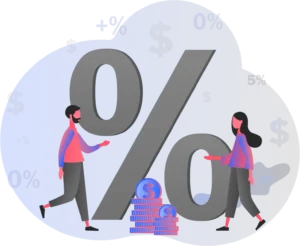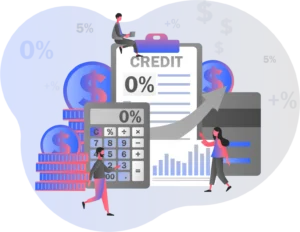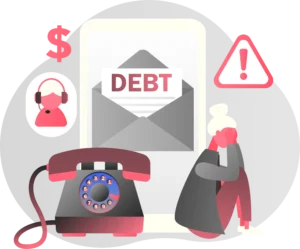Bad credit loans are financial solutions designed for individuals with less-than-perfect credit history, making it challenging to qualify for traditional loans. These loans come in various forms, including secured and unsecured loans, and often feature higher interest rates or require an origination fee to compensate for the higher risk lenders take on.
Advertisements
Types of bad credit loans
We've teamed up with BadCreditLoans to help you find a quick cash loan, even with less-than-perfect credit. Just click any banner in this article to learn more!
Creditpicks
Tweet
Numerous types of loans accommodate low credit scores. These lenders understand that sometimes things do not go as planned and that the borrower’s less-than-perfect credit score is often not their fault. Because of this understanding, they offer loans that include but are not limited to the following:
- Secured loans: Require collateral, such as a vehicle or property, offering lower interest rates due to the reduced risk to lenders.
- Unsecured personal loans: Do not require collateral but come with higher interest rates.
- Payday loans: Short-term, high-cost loans intended for immediate financial needs, but they can lead to a cycle of debt due to very high-interest rates.
- Instalment loans: Offered with fixed monthly payments over a set period, aiding in budget management.
- Home equity loans: A type of loan in which the borrower uses their home's equity as collateral. It is typically a fixed-rate loan that provides a lump-sum payment to the borrower, which is then paid back over a set term.
Loan features
The table below outlines some key features of bad credit loans.
| Interest rates | Typically higher than those for borrowers with good credit. |
| Loan terms | Can vary significantly, from short-term payday loans to longer-term personal loans |
| Repayment terms | Flexible repayment plans are often necessary to manage the higher costs associated with bad credit loans |
| Origination fee(s) | Some loans include an origination fee, which is deducted from the loan amount |
Advertisements
Evaluating your finances

Before applying for a bad credit loan, it's crucial to assess your financial situation thoroughly. This means understanding your credit report, knowing your credit score, and identifying the type of loan that best suits your needs.
Credit report and score
Regularly reviewing your credit report can help you understand what lenders will see when they check your creditworthiness.
Choosing the right lender
The market for bad credit loans is vast, with options ranging from online lenders and credit unions to traditional banks. Each type of lender offers different advantages:
- Credit unions: Often offer more personalized service and lower rates for members.
- Online lenders: May provide more flexible approval criteria and faster funding times.
- Traditional banks: While often stricter in their requirements, they can offer competitive rates for qualified borrowers.
Loan application process

Applying for a bad credit loan involves several key steps, from checking your credit score to loan approval and fund disbursement. It's vital to be prepared with all necessary documents, including personal information, proof of income, and details about your financial situation.
The process typically involves:
- Pre-qualification: Many lenders offer a pre-qualification process that allows you to check your eligibility without affecting your credit score.
- Application: Submit personal and financial information, including income, employment status, and existing debts.
- Approval: If approved, you'll receive a loan offer detailing the terms and conditions.
- Funding: Upon acceptance, the loan amount is usually deposited into your bank account within a few business days.
Advertisements
Tips for borrowers
The following are some proven tips to help you save on interest and avoid potential high-interest loan cycles.
| Seek the lowest possible rate | Even with bad credit, comparing offers can help you find a more affordable loan |
| Consider a co-signer | Having someone with better credit co-sign the loan can improve your terms |
| Beware of predatory lenders | Payday loans and other high-cost loans can trap borrowers in a cycle of debt |
Understanding bad credit loans
Bad credit loans are tailored for individuals with low credit scores or limited credit history. Online lenders, credit unions, and some banks typically offer these loans, each presenting a range of terms and interest rates. It's crucial to understand that these loans come with higher interest rates than standard loans, reflecting the lender's increased risk.
Interest rates and their impacts
Interest rates are critical in any loan decision, particularly for bad credit loans with significantly higher rates. These rates are determined by several factors, including the lender's assessment of the borrower's creditworthiness, the loan amount, and the loan term.
Higher interest rates on bad credit loans reflect the increased risk that lenders take on when offering credit to individuals with less-than-ideal credit histories. It’s essential for borrowers to understand the implications of these rates on their overall repayment amount and to seek out the lowest possible rates for their situation.
A credit union might be able to help
Credit unions often serve as a vital resource for individuals with bad credit. Unlike traditional banks, credit unions are not-for-profit organizations that serve their members. They are known for offering more personalized services and may be more willing to work with borrowers with low credit scores.
Credit unions can offer lower interest rates and fees than traditional financial institutions, making them a compelling option for those seeking bad credit loans.
Your credit report is important
A credit report is a detailed record of an individual's credit history used by lenders to evaluate loan applications. It includes information on credit accounts, payment histories, and derogatory marks such as bankruptcies or collections.
Reviewing your credit report for accuracy is critical when applying for a bad credit loan. Disputing errors can improve your credit score, increasing your chances of loan approval and securing more favourable loan terms.
Advertisements
Comparing bad credit loan options
To clarify the various bad credit loan options available, the table below compares key features of different types of loans.
| Type of loan | APR range | Collateral | Loan term | Features |
| Unsecured personal loans | Higher (up to 35.99%) | No | 1-5 years | Fixed interest rate, no collateral required |
| Secured loans | Lower | Yes | Varies | Lower interest rates, requires asset as collateral |
| Payday loans | Extremely high | No | 2 week-1 month | Short-term, high fees |
| Instalment loans | Varies | No | 6 months-5 years | Fixed monthly payments, available for bad credit |
Making an informed choice

Selecting the right bad credit loan involves more than just comparing interest rates; it's about understanding how each option fits into your broader financial picture. Consider factors such as the potential for improving your credit score, the flexibility of repayment terms, and the presence of any additional fees.
For those navigating the complex terrain of bad credit loans, remember that informed decision-making is your most powerful tool. By carefully evaluating each option and considering the long-term impact on your financial health, you can choose a path that addresses your immediate financial needs and contributes to your overall financial recovery and growth.
What is debt consolidation?
Debt consolidation involves combining multiple debts into a single loan with a fixed interest rate and monthly payment. This strategy is particularly beneficial for individuals with bad credit, as it simplifies payment schedules and can reduce the amount paid in interest over time.
When considering debt consolidation, it's essential to compare the terms of consolidation loans and ensure that the new loan offers a lower overall interest rate than your current debts.
Secured vs. unsecured Loans: Weighing the options
When it comes to bad credit loans, you'll often have to choose between secured and unsecured options. Secured loans require collateral, such as a car or home, which the lender can seize if you fail to repay. These loans typically offer lower interest rates due to the reduced risk to the lender.
On the other hand, unsecured loans do not require collateral, but they often come with higher interest rates and may be harder to qualify for with bad credit. The decision between a secured or unsecured loan should be based on your ability to provide collateral and your comfort level with the associated risks.
Advertisements
Understanding loan terms and their impact
Loan terms, including the interest rate, repayment period, and any additional fees, play a significant role in the total cost of the loan. Longer loan terms can lower your monthly payments but may result in higher total interest paid over the life of the loan.
Conversely, shorter loan terms can lead to higher monthly payments but lower total interest costs. Understanding these terms and choosing a loan that balances affordable monthly payments and minimal long-term costs is crucial.
The actual cost of loan fees
Loan fees, such as origination fees, late payment fees, and prepayment penalties, can significantly affect the overall cost of borrowing. Origination fees are typically a percentage of the loan amount and are either deducted from the loan proceeds or added to the loan balance.
Late payment fees are charged when payments are made past the due date, and prepayment penalties may apply if you pay off your loan early. Awareness of these fees and their impact on your loan is essential for making an informed borrowing decision.
Practical example
Consider a $10,000 unsecured personal loan with an origination fee of 5%, an APR of 25%, and a term of 5 years. The origination fee would amount to $500, reducing the actual amount received to $9,500 or increasing the loan balance to $10,500 if the fee is added.
Over five years, the total interest paid would be approximately $6,896, making the total cost of the loan (excluding the origination fee) $16,896. This example highlights the importance of considering fees and interest rates when evaluating loan options.
Improving your credit score
Improving your credit score is crucial for accessing better financial products and terms. Here are actionable steps you can take:
- Make payments on time: Your payment history is a significant factor in your credit score. Ensure you pay all your bills on time, including utilities, credit cards, and loans.
- Reduce credit utilization: Aim to use less than 30% of your available credit. Paying down balances can improve your credit utilization ratio, positively affecting your score.
- Regularly review your credit report: Check your credit report for errors or inaccuracies that could negatively impact your score. Dispute any errors you find with the credit bureaus. Experian allows you to view all your reports within one user account.
- Limit new credit inquiries: Each time you apply for credit, it can result in a hard inquiry, which may lower your score. Apply for new credit only when necessary.
Ensure you understand your lending options
Exploring loan options from various lenders can provide a broader view of the financial products available to you. Each lender evaluates loan applications differently, so what might be a disqualifying factor for one could be less significant to another. Consider the following:
- Online lenders: Often have more flexible lending criteria and can provide quick funding. They may offer competitive rates for bad credit loans.
- Credit unions: Member-focused and may offer more personalized service and better rates, especially if you have an existing relationship.
- Traditional banks: Likely have stricter lending criteria, but some offer specialized loan products for customers with less-than-perfect credit.
Advertisements
Financial products for poor credit history or score
Several financial products are designed to help individuals with poor credit scores. The table below outlines some of these options.
| Secured credit cards | Require a deposit that serves as your credit limit; they can be an effective way to build or rebuild credit |
| Credit-builder loans | The loan amount is held in a bank account while you make payments; your payment history is reported to the credit bureaus, helping to build your credit |
| Co-signed loans | A co-signer with good credit can help you qualify for a loan and potentially secure a lower interest rate |
Financial education and resources
Educating yourself on personal finance and leveraging available resources can help you to make more informed decisions. Many non-profit organizations offer free credit counseling and financial education programs. Tools like budgeting apps and financial planning services can help you manage your finances more effectively.
Good credit requires patience and discipline
Rebuilding your credit and navigating bad credit loans is a journey that requires patience, education, and strategic planning. You can gradually enhance your financial standing by making timely payments, reducing debt, exploring options with various lenders, and utilizing financial products designed for credit improvement. Remember, the path to financial health is not linear, and setbacks can occur. However, achieving financial stability is achievable with perseverance and the right approach.
Subscribe to our browser alerts for the latest personalized advice and a curated selection of bad credit loan options that cater to your unique situation. Creditpicks is dedicated to helping you navigate the complexities of personal finance, offering tools and resources to guide you toward making empowered financial decisions.
Advertisements




